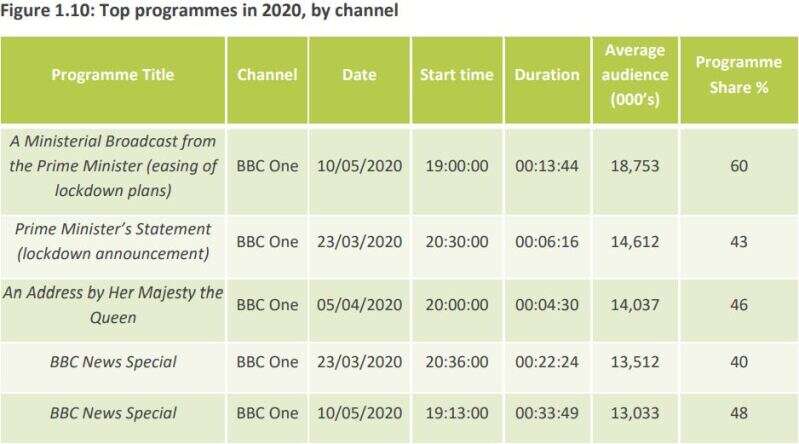
The Covid-19 crisis prompted a surge in broadcast TV viewing driven by demand for news on the pandemic at the start of UK lockdown, but this only lasted for two weeks, new figures from Ofcom show.
Increased news consumption led to public service broadcasters achieving their highest combined monthly viewing share in more than six years in March, with 58.8% of broadcast TV viewing.
The BBC was the most-used source of news and information about Covid-19, with eight in ten people (82%) using it in the first week of lockdown.
Prime Minister Boris Johnson’s address on 23 March announcing lockdown measures for the UK was seen by 28m viewers across seven channels, including +1s, with 18.7m tuning in on BBC One alone.
On the same day news viewing peaked at 59 minutes on average, 349% higher than the 13 minutes viewed on the same date last year, Ofcom’s Media Nations 2020 report shows.
Driven by news, the proportion of the population watching traditional broadcast TV in a week spiked in March, peaking at 88% in the week of 16 March and remaining higher year-on-year the following week.
But it dropped below the previous year’s levels after that and remained lower until the end of June, Ofcom found.
BBC One accounted for the top five most-watched programmes of 2020 so far, made up of the PM’s announcements on lockdown in March and May and the two BBC News specials that followed them, along with an address to the nation from HM The Queen in April.

Among over-54s, the proportion of people tuning in to broadcast TV has remained consistently higher than in 2019 since 16 March.
According to Ofcom, 99% of the UK online population accessed news and information about Covid-19 at least once a day at the start of lockdown, falling to 92% in May and 85% in June.
But the frequency of news access has fallen since the height of the crisis, with almost a quarter of the online population reporting that they accessed news about the pandemic at least 20 times a day or more at the start of lockdown, compared to 4% by the end of June.
A third of respondents (34%) to Ofcom’s rolling news consumption survey said they listened to the radio to access news and information about the pandemic at the start of lockdown, staying at roughly the same levels (30%) through to the end of June.
By comparison, TV was the main source for this information with 80% using it for updates on the pandemic at the start of lockdown and 72% still doing so by the end of June.
The BBC is in the process of putting up to 520 jobs at risk of redundancy in news as it looks to save £40m in the news department, with a further 600 job cuts across the regions expected to save the BBC £25m by 2022.
Despite record viewing figures, the broadcaster faces an estimated £125m in lost income this financial year as a result of the coronavirus crisis. It already had to make £800m in savings by 2022.
Picture: Pixabay
Email pged@pressgazette.co.uk to point out mistakes, provide story tips or send in a letter for publication on our "Letters Page" blog
